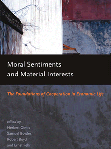The Nature of Wealth and the Dynamics of Inequality
Venue: J.S Gericke Library Auditorium (click here for map of campus)
Date: Tuesday, 3 February 2009
Time: 12.00-13.30
Synopsis of Talk
Human societies differ enormously in the extent of inequality, a topic that has engaged generations of historians and behavioral scientists. In this talk, Sam Bowles will discuss a groundbreaking new project with colleagues Monique Borgerhoff Mulder and others that seeks to explain the striking diversity in the equality–inequality continuum witnessed over the long sweep of history and prehistory.
The study examines patterns of inequality in a wide range of populations ranging from egalitarian foraging bands characteristic of human society during the Pleistocene to the highly stratified agrarian and pastoral societies that developed during the Holocene. The talk will aim to present a dynamical explanation of this continuum in which the long-run steady state inequality in a population depends on the extent to which its most important forms of wealth are transmitted within families across generations. The model he will present is supported by a vast collection of recent field studies and historical investigations into the degree of intergenerational transmission of various types of wealth (somatic, material, and relational) among hunter gatherer, horticultural, pastoral, and small scale agricultural societies. Statistical analyses of these new data show that not only are wealth differences transmitted across generations in even the most egalitarian populations, but also that the extent of wealth inheritance differs systematically across production systems and across wealth types, consistent with the hypothesis that the domestication of plants and animals introduced highly heritable new forms of wealth, displacing many egalitarian foragers and supporting higher levels of permanent inequality in pastoral and agricultural societies. The talk will conclude by considering extentions of the basic model to the modern and future information-based “weightless economy”.
Read more about the study here.
About Sam Bowles
SAMUEL BOWLES, (PhD, Economics, Harvard University) is Research Professor at the Santa Fe Institute where he heads the Behavioral Sciences Program. He is also Professor of Economics at the University of Siena. He taught economics at Harvard University from 1965 to 1973 and at the University of Massachusetts, where he is now emeritus professor. His recent studies on cultural evolution have challenged the conventional economic assumption that people are motivated entirely by self-interest. These have included the mathematical modeling and agent-based computer simulations of the evolution of altruistic behaviors by means of multi-level selection and behavioral experiments in 15 hunter- gather and other small-scale societies. Bowles' current research also includes both theoretical and empirical studies of the role of incomplete contracts in labor markets and financial markets in explaining income inequality.





His scholarly papers have appeared in Science, Nature, American Economic Review, Theoretical Population Biology, Journal of Theoretical Biology, Journal of Political Economy, Quarterly Journal of Economics, Behavioral and Brain Science, Philosophy and Public Affairs, Journal of Economic Literature, Journal of Economic Perspectives, and the Economic Journal. His recent books (see insert) include Unequal Chances: Family Background and Economic Success (Princeton University Press 2004), Moral Sentiments and Material Interests: the Foundations of Cooperation in Economic Life (MIT Press, 2005), and Foundations of Human Sociality: Economic Experiments and Ethnographic Evidence in 15 Small-scale Societies. (Oxford University Press. 2004). His next major work, A Cooperative Species: Human reciprocity and its evolution, is expected to be completed in 2009 and is co-authored with Herbert Gintis.
Policy Work
A major policy theme of Sam's work throughout his career concerns the causes and consequences of economic inequality, with emphasis on the relationship between wealth inequalities, incomplete contracts, and governance of economic transactions in firms, markets, families and communities. As part of this broader research agenda, he has conducted studies of the use and abuse of power in competitive exchange, the transmission of inequality across generations, wealth inequality as a source of allocative inefficiency, the very long term evolution of hierarchical institutions, transitions between egalitarian and unequal institutional regimes, and the relationship between globalization and redistribution. Much of this work is undertaken as part of the MacArthur Research Network on the Effects of Inequality on Economic Performance which he co-heads with Pranab Bardhan.
Professor Bowles has also served as an economic advisor to international institutions such as the World Bank and the International Labor Organization, as well as several governments, notably that of Cuba, Greece, and most recently on the South African Labour Market Commission appointed by Predident Nelson Mandela. He was asked by Martin Luther King Jr. to write a background paper to the 1968 Poor People's March, and later became involved in the presidential campaign of Senator Robert F. Kennedy before both men were tragically assasinated. He also worked on the presidential campaigns of the Reverend Jesse Jackson during the 1980s.
Bowles’ webpage is: http://www.santafe.edu/~bowles
Background Reading
Samuel Bowles and Herbert Gintis
The Inheritance of Inequality
Samuel Bowles and Valeire I. Nelson
The 'Inheritance of IQ' and the Intergenerational Reproduction of Economic Inequality
Bjorklund et al.
Brother Correlations in Earnings in Denmark, Finland, Norway, and Sweden Compared to the United States
Eric Alden Smith and Jung-Kyoo Choi
The Emergence of Inequality in Small-Scale Societies: Simple Scenarios and Agent-Based Simulations
Mike Murphy and Duolao Wang
The Impact of Intergenerationally-Transmitted Fertility and Nuptuality on Population Dynamics in Contemporary Populations
Mike Murphy
Is the Relationship between Fertility of Parents and Children Really Weak?
Tom Hertz et al.
The Inheritance of Educational Inequality: International Comparisons and Fifty-Year Trends
Monique Borgerhoff Mulder
Intergenerational Transmission of Wealth in Hazda
Login
(for staff & registered students)
BER Weekly
23 Jan 2026 Free Weekly Review | Number 3 | 23 January 2026This report covers the key domestic and international data releases over the past week....
Read the full issue
BER Weekly
23 Jan 2026 Free Weekly Review | Number 3 | 23 January 2026This report covers the key domestic and international data releases over the past week....
Read the full issue

